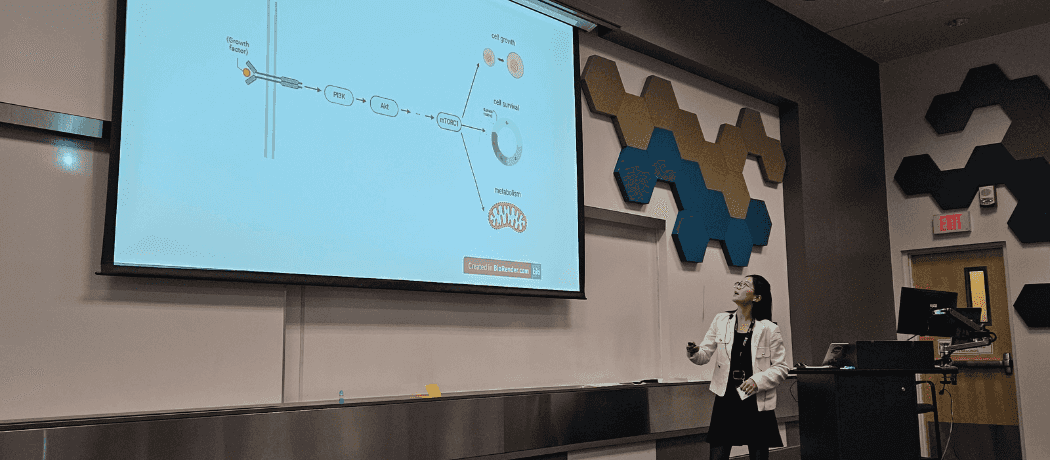
Summer Research Experience: Interview with OVC DVM Student Miranda (Yuan) Bie
March 07, 2024
(pictured above: OVC DVM student Miranda (Yuan) Bie presenting at the Canadian Emerging Veterinary Scholars Summit in Calgary.)
Miranda (Yuan) Bie is currently in her second year of the Doctor of Veterinary Medicine (DVM) program at the Ontario Veterinary College (OVC). Last summer, she participated in OVC’s Summer Career Opportunities and Research Exploration (SCORE) Program. This program allows undergraduates and DVM students to engage in research projects under the supervision of an OVC faculty member. After spending a month working on their research assignments, students share their experiences in an oral presentation competition at OVC. The winners go on to participate in competitions outside of the University of Guelph.

After winning first place in the 2023 SCORE competition (DVM category), Bie went on to compete and win at the Canadian Emerging Veterinary Scholars Summit in Calgary (DVM category).
What interested you in the SCORE program?
I wanted to do research in Dr. Anthony Mutsaers’ lab since I started at OVC. I had some previous experience with human cancer research and was very eager to learn more about cancer in companion animals. After meeting with Dr. Mutsaers, he suggested that I apply to do research in his lab through the SCORE Program.
Students interested in participating in SCORE can apply for a summer research studentship with an OVC faculty member in early winter through Experience Guelph. Students who are successful in receiving a summer research position with an OVC faculty member may then register to participate in the SCORE program in early spring.
What was your summer research experience like?
My summer research project involved understanding how targeting molecular pathways in canine melanoma can affect cancer metabolism. In particular, I was looking at the mTOR/PI3K pathway.

On a given day, I would observe the cancer cells under the microscope, continue to grow them sterilely, and use some in a Seahorse experiment, which provides more info on cell metabolism. My peers in the lab were also very friendly and happy to help with any questions I had.
My results are still preliminary, but I did find that targeting the mTOR/PI3K molecular pathway does have some effect on metabolism in canine melanoma.
I thought cancer research was interesting before SCORE, and now I think cancer research is even more interesting! There’s just so much potential for improving treatment modalities and I am considering research in this field as part of my future career.
What was it like working with Dr. Mutsaers?
Research can be really daunting to start, but Dr. Mutsaers was an invaluable mentor throughout the summer. From suggesting readings that helped me understand melanomas and their metabolism to the countless discussions we had regarding the direction of the project, Dr. Mutsaers was supportive, friendly, and incredibly knowledgeable. I never felt like I was alone. Whenever I was stuck on a particular part of the project – as all researchers will – I could easily reach out to Dr. Mutsaers or my peers in the lab for their insight. As a result, I feel like I have a much stronger understanding of melanoma cells and their metabolism thanks to the direction and mentorship provided by my advisor.

In the photo: OVC students conducting research in Dr. Mutsaers' lab. From left to right: Gabriella Allegrini, Oncology DVSc student in Clinical Studies; Aidan Russell, MSc student in Biomedical Sciences; Miranda (Yuan) Bie, DVM phase 2; and Michelle Shoong, DVM phase 3. Dr. Mutsaers is in the back row.
How did the SCORE experience help you with your studies?
Honestly, I did not enjoy writing abstracts and papers as an undergrad. Scrambling to write a coherent story at the last minute and the anxiety over my mark made writing papers quite a dreaded event. However, SCORE provided an environment and resources for me to practice my abstract and paper writing skills without the pressure of getting graded. I appreciated the opportunity to learn about scientific writing in such a relaxed and supportive environment.
How did it feel to win 1st place in the SCORE competition (DVM category)?
Winning 1st place was completely unexpected! I never thought of myself as an excellent public speaker, and I have quite a bit of stage fright! However, winning 1st place showed me that public speaking wasn’t impossible. I just needed to sit down and practice.
What was your experience like at the Canadian Emerging Veterinary Scholars Summit (CEVSS)?
CEVSS was a 3-day conference with speakers from veterinary and research experts, tours of the University of Calgary veterinary school, as well as presentations from DVM students and veterinary research students. I was surrounded by students from across Canada, as well as some from the UK, so I felt like my project was being shared with a wider audience. It was scary but very exciting!
Bie placed 1st in the DVM student presentation category at CEVSS.
What advice would you give to other undergraduate or DVM students who might be thinking about applying to the SCORE program?
I would say do it! The summer especially is a terrific time to embark on a research adventure. For any student who enjoys honing their understanding of niche topics of interest and even discovering more on that topic, definitely participate in research!
Information on the 2024 SCORE program is available by visiting their website.
Questions about the program can be directed to Taylor Scully tscully@uoguelph.ca.
.png)